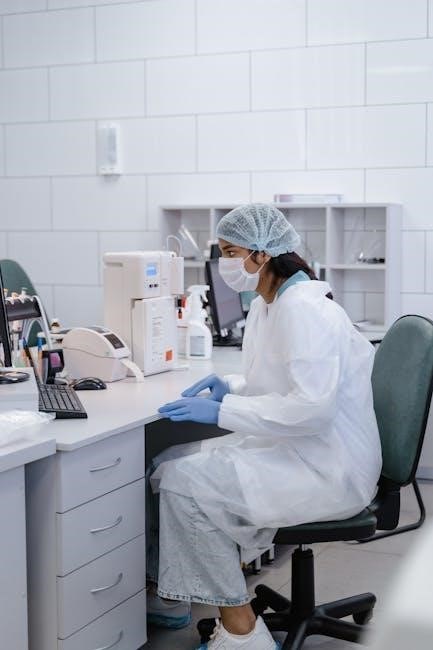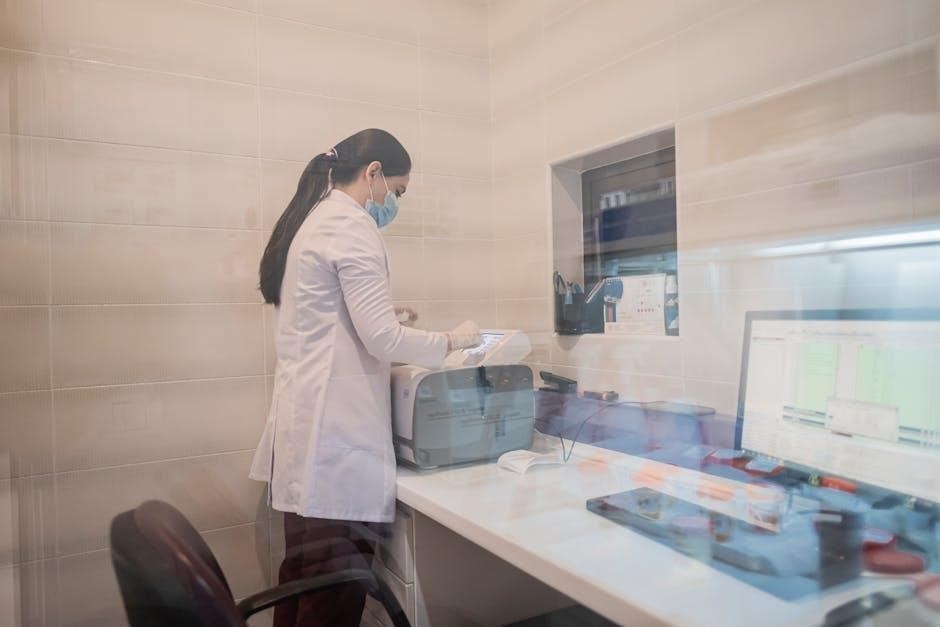The MS Computer Science entry test is a crucial gateway for admission to advanced degree programs, assessing candidates’ knowledge in English, mathematics, and core computer science concepts through MCQs.

Importance of MCQs in the Entry Test
MCQs (Multiple Choice Questions) play a pivotal role in the MS Computer Science entry test, serving as a cornerstone for assessing a candidate’s knowledge and problem-solving abilities. These questions are designed to evaluate a broad range of topics, from fundamental concepts to advanced theories, ensuring a comprehensive understanding of the subject. MCQs are time-efficient, allowing candidates to demonstrate their expertise within a structured format. They also help in identifying a candidate’s ability to think critically and make quick decisions under pressure. Given their wide coverage, MCQs are an effective tool for universities to filter potential candidates for advanced programs. Moreover, practicing MCQs aids in improving time management and reduces exam anxiety. As highlighted in various resources, MCQs are repetitive and cover essential areas, making them indispensable for preparation. Thus, mastering MCQs is crucial for success in the entry test.
Syllabus Overview
The MS Computer Science entry test syllabus covers three main sections: English (25%), Mathematics (25%), and Computer Science (50%). It includes grammar, vocabulary, comprehension, algebra, calculus, statistics, programming, data structures, algorithms, and computer systems.
English Section
The English section in the MS Computer Science entry test evaluates a candidate’s proficiency in grammar, vocabulary, and comprehension. It typically includes multiple-choice questions (MCQs) that assess sentence structure, verb tenses, and sentence completion. Vocabulary questions may involve identifying synonyms, antonyms, and word meanings. Reading comprehension passages are also included to test the ability to understand and analyze written content. Additionally, error detection and sentence improvement questions are common, requiring candidates to identify grammatical errors or suggest corrections. This section is designed to ensure that students have a strong command of the English language, which is essential for academic success in a graduate program. Proper preparation involves practicing MCQs and engaging in regular reading to enhance comprehension skills. It is advisable to review grammar rules and expand vocabulary to perform well in this section.
Mathematics Section
The Mathematics section in the MS Computer Science entry test is designed to assess a candidate’s analytical and problem-solving skills. It covers key areas such as algebra, calculus, probability, and statistics. Questions often focus on concepts like functions, limits, derivatives, and integrals, as well as sequences and series. Discrete mathematics, including combinatorics and graph theory, is also a significant part of this section. The questions are typically multiple-choice (MCQs), requiring candidates to apply mathematical principles to solve problems. Strong preparation in these areas is essential, as they form the foundation of computer science. Candidates should practice solving numerical problems and reviewing mathematical proofs to excel in this section. Regular practice with sample MCQs and past papers can help improve both speed and accuracy. This section is critical for demonstrating a candidate’s ability to handle the mathematical rigor required in advanced computer science studies.
Computer Science Section
The Computer Science section of the MS entry test evaluates a candidate’s understanding of fundamental concepts and advanced topics in the field. It covers areas such as data structures and algorithms, programming languages, software engineering, operating systems, and computer architecture. Questions often focus on topics like sorting algorithms, tree and graph traversals, and database management systems. Additionally, this section may include MCQs on networking fundamentals, cybersecurity, and theoretical computer science, such as automata theory and formal languages. Candidates are expected to demonstrate both conceptual knowledge and the ability to apply it to practical problems. Preparation should include reviewing textbook materials, solving practice problems, and familiarizing oneself with common MCQ patterns. Strong performance in this section is crucial for securing admission, as it directly assesses a candidate’s readiness for graduate-level computer science studies. Regular practice with relevant MCQs and past papers is highly recommended.

Popular MCQ Topics in Computer Science
Popular MCQ topics in the MS Computer Science entry test often revolve around core areas of the subject. Data structures and algorithms are prominently featured, with questions on sorting, searching, and graph traversal. Programming concepts, including language syntax and object-oriented programming principles, are also common. Operating systems, particularly process management and memory allocation, frequently appear. Networking fundamentals, such as protocols and network architectures, are another key area. Cybersecurity questions, focusing on encryption and authentication, are increasingly popular. Database management systems, including SQL and relational databases, are also widely tested. Software engineering concepts, like design patterns and software development life cycles, are often included. Additionally, MCQs on computer architecture, such as hardware components and memory management, are regularly seen. These topics are considered critical for assessing a candidate’s foundational knowledge and problem-solving skills in computer science. Regular practice with these areas is essential for success.
Preparation Strategies
Effective preparation for the MS Computer Science entry test requires a well-structured approach. Start by thoroughly understanding the syllabus and weightage distribution of each section. Allocate time to English, mathematics, and computer science topics based on their importance. Use authentic resources, such as past papers and recommended textbooks, to familiarize yourself with the exam format. Regularly practice MCQs from reliable sources like ExamAunty.com and focus on improving problem-solving skills. Mock tests are essential to enhance time management and accuracy. Identify weak areas through analytics and dedicate extra time to strengthens them. Join study groups or forums to discuss challenging topics and gain insights from peers. Maintain a consistent study schedule and avoid cramming. Focus on conceptual clarity rather than rote learning, especially for complex subjects like algorithms and data structures. Finally, stay calm and manage your time wisely during the test to ensure optimal performance.
Role of Practice Tests
Practice tests play a pivotal role in preparing for the MS Computer Science entry test. They simulate real exam conditions, helping candidates assess their readiness and identify areas needing improvement. By attempting MCQs, students can refine their time management skills, ensuring they complete the test within the allotted 150 minutes. Regular practice tests reveal knowledge gaps, allowing focused study on weak topics. They also enhance problem-solving speed and accuracy, crucial for high scores. Additionally, practice tests reduce exam anxiety by familiarizing candidates with the test format and question types. Utilizing resources like ExamAunty.com and past papers ensures exposure to a diverse range of questions, covering English, mathematics, and core computer science subjects. Consistent practice fosters confidence and readiness, making practice tests an indispensable tool in achieving success in the entry test.

Time Management Tips
Effective time management is critical for success in the MS Computer Science entry test. Allocate time wisely: spend 1-1.5 minutes per MCQ to ensure completion within the 150-minute window. Prioritize high-confidence questions first to secure early points. Skim through the entire paper to identify easy questions and tackle them immediately; Avoid spending excessive time on a single question; mark it for review and return later if time permits. Use the remaining 10-15 minutes to review unanswered or uncertain questions. Practice time management during mock tests to build stamina and accuracy. Focus on eliminating incorrect options to increase the chances of selecting the right answer. Stay calm and systematic to maintain clarity during the exam. Proper time allocation and strategic question attempts are key to maximizing scores.

Common Mistakes to Avoid
Several common mistakes can hinder performance in the MS Computer Science entry test. Neglecting basic concepts and focusing only on advanced topics is a frequent error, as questions often test fundamental knowledge; Time mismanagement is another pitfall; candidates often spend too long on difficult questions, leaving easier ones unattempted. Additionally, many students fail to read questions carefully, leading to incorrect interpretations. Guessing without eliminating incorrect options reduces the chances of selecting the right answer. Overconfidence in unprepared areas can also lead to avoidable errors. Panic and stress during the exam impair decision-making and accuracy. Lastly, skipping MCQs without attempting them results in lost opportunities for partial scoring. Being aware of these mistakes and taking steps to avoid them is crucial for achieving a high score. Proper preparation and practice can help mitigate these issues and improve overall performance.
Algorithm and Data Structure Questions
Algorithm and data structure questions are fundamental to the MS Computer Science entry test, testing problem-solving skills and conceptual understanding. Key topics include sorting, searching, graph traversal, and dynamic programming. Candidates must grasp data structures like arrays, linked lists, trees, and graphs, as these are frequently tested. Understanding time and space complexity is crucial, as many MCQs focus on optimizing algorithms. Practice with problems involving recursion, hashing, and string manipulation is essential. Students often struggle with advanced concepts like greedy algorithms and divide-and-conquer strategies, so thorough preparation is vital. Regular practice with multiple-choice questions on these topics helps build both speed and accuracy. Avoiding common errors in algorithm design and implementation is key to securing high scores. Familiarity with standard libraries and data structure operations is also necessary. Proper preparation ensures candidates can tackle even the most challenging algorithm-related MCQs confidently.
Database Management Systems MCQs
Database Management Systems (DBMS) MCQs are a significant part of the MS Computer Science entry test, focusing on core concepts and applications. Key areas include relational databases, SQL queries, normalization, and database design. Questions often cover ER diagrams, transaction management, and indexing techniques. Understanding the differences between various database models, such as relational and NoSQL, is essential. MCQs may also test knowledge of database security, concurrency control, and query optimization. Students should practice with scenarios involving database schema design and performance tuning. Familiarity with DBMS tools and their functionalities is crucial. Common pitfalls include misinterpreting normalization levels and misunderstanding query execution plans. Regular practice with multiple-choice questions on these topics helps build both speed and accuracy. Mastery of DBMS concepts ensures candidates can confidently tackle related MCQs in the entry test, making it a fundamental area of preparation.
Computer Systems and Architecture
Computer Systems and Architecture is a foundational section in the MS Computer Science entry test, focusing on the design, organization, and operation of computer hardware and software components. MCQs in this area cover topics such as system architecture, memory management, input/output systems, and parallel processing. Key concepts include von Neumann architecture, pipelining, cache memory, and multiprocessing systems. Questions often test understanding of hardware components like CPUs, GPUs, and buses, as well as virtualization and embedded systems. Familiarity with instruction set architectures, addressing modes, and performance metrics is essential. Practice with diagrams and case studies helps in grasping complex topics like multicore processors and distributed systems. This section evaluates a candidate’s ability to analyze and optimize system performance, making it a critical area for preparation. Regular review of system design principles and modern advancements ensures readiness for related MCQs in the entry test.
Networking Fundamentals
Networking Fundamentals is a critical component of the MS Computer Science entry test, evaluating understanding of computer networks and their underlying principles. MCQs in this section cover essential topics such as network topologies, protocols, and devices. Key areas include OSI and TCP/IP models, IP addressing, subnetting, and common networking devices like routers and switches. Questions also focus on network performance, security, and wireless communication protocols. Understanding concepts like HTTP, FTP, DNS, and DHCP is vital. Additionally, knowledge of network layer technologies like NAT, VPNs, and QoS is frequently tested. Familiarity with network security mechanisms, such as firewalls and encryption, is also crucial. Candidates should practice troubleshooting scenarios and configurations to excel in this section. Regular practice with network diagrams and simulations helps in mastering these topics, ensuring strong performance in related MCQs during the entry test.

Software Engineering Concepts
Software engineering concepts are a cornerstone of the MS Computer Science entry test, focusing on the principles and methodologies used in software development. Key topics include the Software Development Life Cycle (SDLC), various development models like Waterfall, Agile, and Scrum, and software design patterns. Understanding requirements gathering, analysis, and specification is crucial, as well as knowledge of software testing methodologies, including black box, white box, and gray box testing. Questions often cover software quality assurance, configuration management, and version control systems. Familiarity with Unified Modeling Language (UML) diagrams, such as use case, class, and sequence diagrams, is also essential. Additionally, concepts like software metrics, project management, and risk analysis are frequently tested. Practical knowledge of software tools and methodologies helps candidates tackle MCQs effectively in this section. Regular practice with case studies and real-world scenarios enhances preparedness for software engineering-related questions.
Operating Systems MCQs
Operating Systems (OS) MCQs are a significant part of the MS Computer Science entry test, testing fundamental concepts and advanced topics. Key areas include process and thread management, covering types of schedulers, context switching, and synchronization techniques like semaphores and monitors. Memory management is another critical focus, with questions on virtual memory, paging, segmentation, and memory allocation algorithms. File systems, including file organization, access methods, and disk scheduling, are also prominent. Concepts like deadlock prevention, avoidance, and recovery, as well as concurrency control, are frequently tested. Storage management, including RAID levels and I/O management, may appear. Additionally, questions on OS security, such as authentication and access control mechanisms, are common. Familiarity with modern OS features like multi-core processors and virtualization is beneficial. Solving practice MCQs on these topics ensures a solid grasp of OS principles and enhances readiness for the test. Regular revision of key concepts helps in tackling both theoretical and scenario-based questions effectively.
Cybersecurity Questions
Cybersecurity questions in the MS Computer Science entry test assess knowledge of network security, encryption, and threat prevention. Topics include firewalls, intrusion detection systems, and secure communication protocols. Encryption methods like AES, RSA, and public-key cryptography are commonly tested. Questions on malware, phishing, and DDoS attacks evaluate understanding of cyber threats. Access control mechanisms, biometric authentication, and secure password policies are also covered. Familiarity with security frameworks like ISO 27001 and NIST is essential. Data protection laws, such as GDPR and CCPA, may appear. Emerging topics like zero-day exploits, ransomware, and cloud security are increasingly relevant. Practice MCQs on these areas ensure readiness for the test. Regularly reviewing case studies and recent cyber threats enhances problem-solving skills. Utilizing past papers and online resources is recommended for thorough preparation in this critical domain of computer science. Mastery of these concepts is vital for securing a strong position in the entry test.
